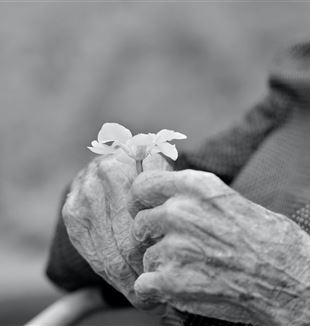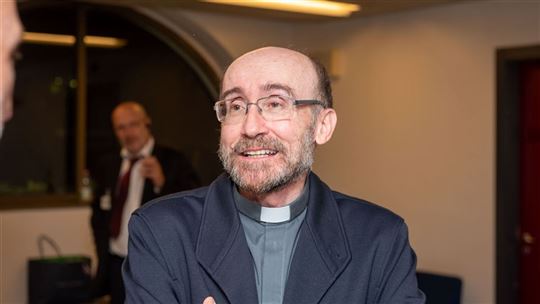
Infinite dignity
In the June issue of Traces, a dialogue with theologian Javier Prades on the recent Vatican Declaration: “A judgment on the present and a meeting point for those who share the value of the person proposed by the church.”The definitive drafting of Dignitas Infinita by the Dicastery of the Doctrine of the Faith took five years of work and much revision in light of the papal magisterium of the last decade. As is written at the end of the Presentation section: “This Declaration aims to offer some points for reflection that can help us maintain an awareness of human dignity amid the complex moment in which we are living. This is so that we may not lose our way and open ourselves up to more wounds and profound sufferings amid the numerous concerns and anxieties of our time.” We spoke about this with Fr. Javier Prades, theologian and rector of the San Damaso Ecclesiastical University in Madrid.
How important is this declaration today?
At every historical juncture, the church expresses judgments on the reality it is facing, which on the one hand have the capacity to illuminate situations, and on the other to reinvigorate the reasonableness of faith. This document moves in this direction, that is, to encourage a judgment on the present. What is our present? I find Pope Francis’s formula on the “epoch of changes” extremely topical, and I would say that there are two important factors to reflect on concerning what the human is today. The first is the unparalleled technological development in which we are immersed, and the second is a direct consequence of that: the new possibilities acquired become rights.
An example of this?
Surgical and biochemical technology, which makes it possible to think about gender transition, immediately becomes a right. It is no longer a possibility, but something I am entitled to. This mentality, especially characteristic of the Western world, claims to relate to every aspect of life as a subjective right. 
A negative meaning of right, then.
First of all, an absolute meaning in the etymological sense: unrelated to anything other than one’s own self-determination. One of the reasons for speaking of the dignity of the person, according to the categories proposed in the document, is to emphasize that rights–a very important category in the evolution of society in its social and juridical dimension–can be deformed into a subjectivist exasperation that does not respect all the factors and has the effect of reducing the person’s true stature. In this sense it is negative.
What novelty does this declaration represent or introduce with respect to the judgments and concerns of the church?
There is always a dimension of continuity, as is emphasized in the first chapter, in which the text summarizes the view that the Bible and the magisterium of the church have always had on the dignity of the human being. A new aspect is certainly the significant presence of references to the magisterium of Pope Francis.
In the introduction and in the first three chapters, a number of key points are set out. First of all, the “ontological dignity of the person” is spoken of, followed by moral, social, and existential dignity. The document states: “The dignity of others is to be respected in all circumstances, not because that dignity is something we have invented or imagined, but because human beings possess an intrinsic worth superior to that of material objects and contingent situations. This requires that they be treated differently.”
Here, we get to the heart of the document. “Ontological dignity” may sound like an abstract expression, but it rests on the fact that we are creatures who have received participation in the highest dignity–our relationship with God. We are made by God and are oriented toward God through the unfolding of our lives. Dignity has an ontological foundation in our being a person, it has a value intrinsic to human nature, unassailable and indestructible in any circumstance or situation. This ontological dignity then has moral, social, and existential implications.
Can you explain this further?
Every human life must be recognized in its meaning, in its value as an existential position, social fulfillment, and moral behavior. Only if these three dimensions originate from what we have called “ontological dignity” can one look at human experience in its entirety and unity. No economic, social, or health difficulties can diminish the judgment of people’s dignity. The declaration speaks precisely of unconditional respect for “human” dignity, not just “personal” dignity, because there is a risk that a person is understood only as “one who is capable of reasoning,” so that a disabled person, an unborn child–to offer just a couple of examples offered at the end of the declaration–could not be a bearer of dignity. This avoids serious misunderstandings.
The word dignity is accompanied by the adjective “infinite.”
Originating from God’s creaturely gesture, it is not measurable: we are created for infinity and no human power can take the place of this infinity.
In fact, the declaration delves into the relationship between dignity and freedom. Ontological dignity is freely realized in the time and space of life. This speaks of the dramatic nature of the human condition of becoming what one can and must become. But it is only a freedom that rests on dignity as a relationship with the Mystery that cannot be subjugated to the powers of the world and does not succumb to the subjectivist drift of rights, which we have already alluded to. In this sense, another element comes into play: responsibility, that is, exercising my freedom in such a way that my dignity matures and becomes a good for me and for others.
This is where the theme of peace comes in.
The first peace is with oneself and is possible through a recognition of dignity as gift. To the extent that this becomes a human experience, encompassing every aspect and circumstance of life, one can think of a civilization of love, a building of peace, as the declaration calls for. The condition for peace is that there are people at peace in search of the meaning of life. The alternative is violence, because people tend to impose their conception of rights.
We speak of peace while we are surrounded by war.
In war, the value of coexistence is destroyed and a predefined idea of coexistence is imposed that does not have the dignity of the other person or people in mind. The church cries “no” to war. Benedict XV for the First World War, Pius XII for the Second World War, John Paul II for the Gulf War, then Benedict XVI’s, and today Pope Francis’s, appeals also to move in this direction.
Read also - Giussani-Niebuhr: Generative thought, authentic sonship
On April 11th, the European Parliament voted in favor of including the right to abortion in the Charter of Fundamental Rights of the European Union. Just a few days after, this declaration reaffirmed that abortion is among the most serious violations of human dignity. In the final part, it urges that “respect for the dignity of the human person beyond all circumstances be placed at the center of the commitment to the common good and at the center of every legal system.” Almost an appeal to states…
As far as the juridical-political institutions of our Western world are concerned, I believe we are going through a moment of great difficulty, and I do not expect much from the European institutions. With regard to abortion, like other issues–surrogacy, gender theory, and migrants, for example–a subjectivist understanding of rights is favored. I would, therefore, like to emphasize the value of and capacity that this text represents for a dialogue with social actors who may not share the church’s anthropological outlook, but with whom we can identify regarding some points. I am thinking in particular of certain currents of Western feminism that identify with the denunciation of the trafficking of women, sexual abuse, gender theory, and surrogate motherhood. The meeting point is a view of the human that, on the one hand, brings out the reasonableness of the Christian position and, on the other, allows action to be taken to promote change at the political and legal levels. But other examples can be given.
Which ones?
I am thinking of the associations for the rights of the disabled, who will find comfort in the declaration. I know so many parents, even nonbelievers, who, despite the difficulties, know how to appreciate their children with disabilities by first of all recognizing that they are human and, therefore, have their own infinite dignity. They come to see their child in the light of his or her ontology. It is always a path fraught with difficulties, but when a disabled person is accepted in his or her being, a unity is generated with those around him or her, and he or she becomes a point of humanity for others. We can say that the human becomes humanized. It is certainly not a process that is concluded once and for all. Let me give another example, concerning the drama of euthanasia. How many people ask for the “end of life” out of a sense of loneliness or fear of suffering? Loneliness and fear obscure the meaning of life. But that is not what they really want–their deepest desire is not to be alone, not to suffer, and to be welcomed. This text points out a path, not only theoretical, but practical, on which the church as the teacher of humanity unveils the human and sustains the proper focus of the human.